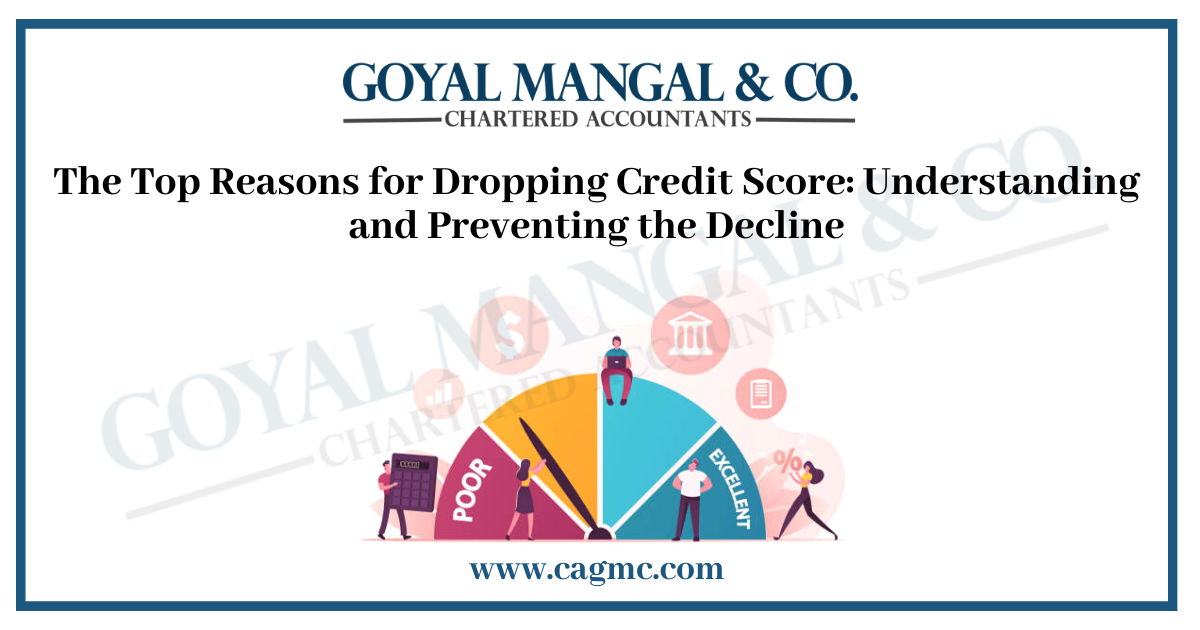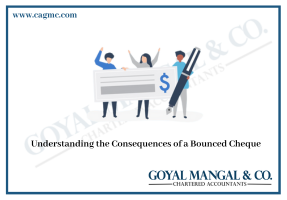
Credit scores play an important role in a person’s financial life. A high credit score makes it easier to get approved for loans, credit cards, and mortgages, while a low score can make it more difficult to obtain credit and often results in higher interest rates and fees.
Unfortunately, it is not uncommon for people to see their credit scores drop unexpectedly. There are several reasons why this may happen, and it’s important to understand them so you can take steps to fix your credit score if necessary. In this article, we will discuss reasons why your credit score might suddenly drop.
|
Table of Content |
Let us understand about Credit Score before we shall move on to discuss its reasons for dropping Credit Score.
Meaning of Credit Score
A Credit Score is a numerical representation of a person’s creditworthiness, which is determined by analyzing their credit history and financial behavior. It is a key factor used by lenders, banks, and other financial institutions to evaluate the risk of lending money to an individual.
The Credit Score ranges from 300 to 850, with a higher score indicating a lower risk to the lender and a better credit standing. The score is calculated by analyzing several factors, including payment history, credit utilization, length of credit history, types of credit accounts, and recent credit inquiries. These factors are used to determine how likely a person is to repay their debts and whether they are a good candidate for a loan or credit card.
The credit reporting system takes into account not only the negative information that is currently on a person’s credit file but also the positive factors. So, everything goes into account when determining the sort of score, we have on our file. In India the average of credit score that lies between 622 and 1200 is generally considered to be pretty good. Any higher on the right track, any lower have a bit of work to do when it comes to getting our credit rating up to an acceptable level.
Importance of Credit Score for the Individual
The importance of a credit score cannot be overstated. A high credit score can have a significant impact on a person’s financial life, giving them access to better interest rates and loan terms. This can save them thousands of dollars over the life of a loan and make it easier to get approved for credit cards, car loans, and mortgages. On the other hand, a low credit score can make it difficult to obtain credit and may result in higher interest rates and unfavorable loan terms.
In addition to helping people secure loans and credit cards, credit scores can also be used for other purposes, such as determining insurance rates and rental applications. Landlords and insurance companies may use a person’s credit score to determine their likelihood of paying bills on time, which can impact the rates they are offered. A low credit score can make it difficult to rent a property or get insurance, so it is important to maintain a high score.
Benefits for having a High Credit Score
A High Credit score means that the individual is seen as a low risk borrower and is more likely to receive favorable loan terms. The following are benefits for having a high credit score:
- The Benefits of having a high credit score are numerous. One of the most obvious benefits is the ability to secure loans and credit cards at favorable terms. Lenders and credit card companies are more likely to approve applicants with high credit scores and offer lower interest rates and fees. This can result in significant savings over time.
- Another Benefit of having a high credit score is that it can help you get a better deal on insurance. Many insurance companies use credit scores to determine an individual’s risk and adjust their rates accordingly. If you have a high credit score, you may be eligible for lower rates and better coverage options.
- A High Credit score can also make it easier to rent an apartment or buy a home. Landlords and mortgage lenders use credit scores to determine an individual’s financial stability and the likelihood of them paying their rent or mortgage on time. A high credit score can make the process of finding a place to live or buying a home much easier and more affordable.
- Having a High Credit score can also help you get a job. Many employers check an applicant’s credit score as part of their background check. A high credit score can indicate that an individual is responsible and financially stable, making them a more attractive candidate for employment.
Dropping of Credit Score
Dropping of credit score is an unfortunate occurrence that affects millions of people every year. A drop in credit score can be a result of a variety of reasons, including late payments, high credit card balances, maxing out credit cards, bankruptcy, and other negative credit events.
Factor relating with Dropping of Credit Score
The following are the factors affecting the dropping of credit score:
- Late Payments: One of the most common reasons for a drop in credit score is late payments. Late payments can have a serious impact on credit score, especially if the payment is 30 days or more past due. Late payments are seen as a sign of financial instability and the inability to repay debts on time, which is why they are so heavily penalized by credit bureaus.
- High Credit Card Balances: Another factor that can cause a drop in credit score is high credit card balances. This occurs when an individual uses a high percentage of their available credit, which indicates a higher risk to lenders. A high credit card balance can also reflect a lack of financial management skills, which can further harm an individual’s credit score.
- Maxing Out Credit Cards: Maxing out credit cards is another factor that can cause a drop in credit score. This occurs when an individual has reached their credit limit, which means they cannot make any more purchases until they pay down their debt. Maxing out credit cards is seen as a red flag by lenders, as it indicates that an individual may not be able to manage their finances and may not be able to repay their debts.
- Bankruptcy: Bankruptcy is a serious financial event that can have a devastating impact on credit score. This occurs when an individual is unable to repay their debts and seeks protection from their creditors through a legal process. Bankruptcy stays on an individual’s credit report for 10 years and can severely impact their ability to get approved for credit in the future.
- Other Negative Credit Events: Other negative credit events such as foreclosures, repossessions, and charge-offs can also cause a drop in credit score. These events indicate financial difficulties and the inability to repay debts, which are seen as a red flag by lenders.
Reasons for Dropping Credit Score
The following are the reasons for the Dropping Credit Score:
- Credit Utilization Ratio May Have Gone Up
This ratio refers to how much of your available credit you have used at any time and it accounts for 30% of your credit score. It doesn’t matter if you pay your credit card bills on time. As your ratio is high, your credit score may have fallen down. If one has a high credit utilization ratio, it can cause a drop in your credit score. One should check your credit limit usage on both an overall and per-card basis. It’s ideal to not consume more than 30% of your credit limit on any card. If someone wants to have a good credit score, scale down your credit utilization ratio.
The Fix for Credit Utilization Ratio going Up:
Try to increase your available credit limit to keep the ratio down. Alternatively, one can apply for additional credit cards to keep the overall credit ratios down.
- Missed the payment and the same is showing on your credit report: Missed payments that are 30 days late or more can severely damage your credit score because timely payments are one of the biggest factors that build your credit score. The worst part is that the late payments stay on your credit report for over five to seven years. You can improve your credit report by piling up a streak of on-time payments, but the recovery will be slow, especially if you have a high credit utilization ratio.
The Fix for Missing Payments: Set up alerts on your phone or auto debit options for your payments, so that you don’t miss out on any bills.
- A Negative Remark Was Added to Credit Report: If you see a major drop in your credit scores, then it could be because of a derogatory remark. The reasons for this may be
The Fix for Negative Remark that Was Added to Credit Report: If you notice any derogatory remark on your credit report, make sure to take corrective action immediately to fix it.
- Closed Credit Card: Since the credit limit on a closed credit card is removed from your credit report, you will have less overall accessible credit. As a result, if you’ve been holding any amounts, they will account for a larger portion of your available credit, increasing your credit utilisation. In addition to this, the average age of your credit accounts might reduce if you close a credit card.
Fix to close Credit Card: It Examines your credit usage regularly in order to avoid excessive credit utilization. However, if it is high, you can balance it by making outstanding payments, requesting an increase in your credit limit, or getting a new credit card.
- Other Person Using Your Credit Card: You may allow another person to use a credit card connected to your account. By doing so, they will receive a credit card in your name and may use it to make purchases. However, if the person does not use the card responsibly, it may raise your credit usage, lowering your credit ratings.
Fix for other person using your Credit Card: You must set a spending cap for the authorized user before adding them to your account. It may assist you in avoiding errors that might damage both your and the authorized user’s ratings.
- Applying for new credit card: Any application for new credit, be it a credit card, a line of credit, or a loan, results in a hard inquiry on your credit file. Each hard inquiry can cause your score to drop a few points, although it’s nothing big.
Fix to applying for new Credit Card: There’s no work needed on your part this time, as hard inquiries only affect your credit for a year. One hard inquiry won’t cause that much of a dip in your score.
Conclusion
A credit score is one of the most important aspects that assist you in procuring any loan or a credit card easily and quickly. A score above 750 is deemed a good number. While assessing your eligibility for any loan or credit card, your credit score is the foremost factor that is taken into consideration.







